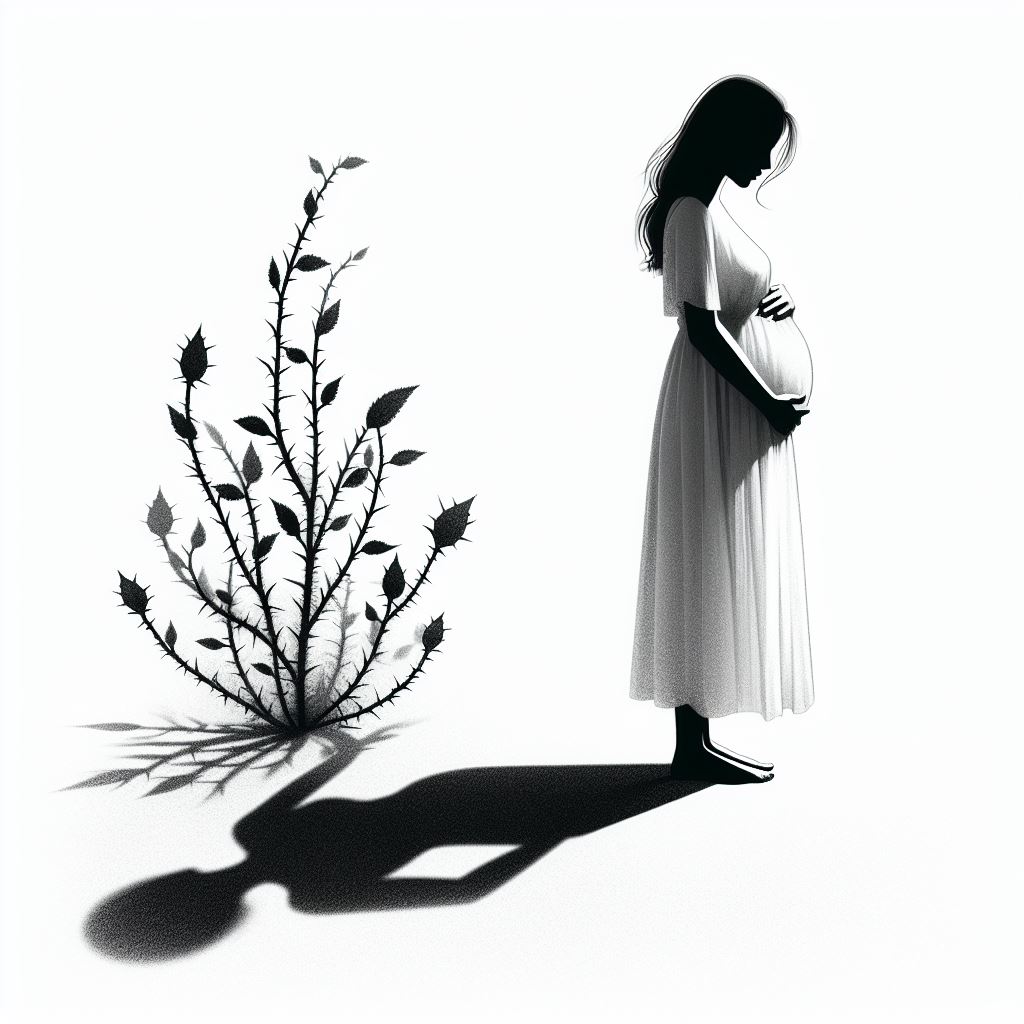 Genesis 1:2
Genesis 1:2

A Queen Divided and a Dark God


"The woman of a valiant one is the crown of her lord. And as a rotten one in his bones, is the one who causes shame." (Proverbs 12:4 RBT)
"Your hair is a herd of goats which have reclined down from the Revealed Witness ("Gilead")..." (Song of Solomon 6:5 RBT)

Strong’s #7363, rachaph, flutter the wings.
Participle feminine singular מרחפת. The “spirit/wind” is a feminine noun and therefore a feminine verb form is used here. This syntax has been covered up by scholars and translators since time immemorial. This word is related to the word for wing (kanaph #3671). An eagle flutters upon his nestlings (Deut. 32:11), “the whole of my bones flutter…” Jer. 23:9. There appears to be an allegorical meaning of “bones” as well...

The Abyss vs. The Foundation of Peace
"Sing barren one—she who has not begotten! Burst forth a cry of joy! She who has not whirled around! For the sons of the Desolate Widow are more abundant than the sons of the Owned/married one!" (Isaiah 54:1 RBT)
Shulammite woman: "Black is myself, but lovely are the built-daughters of the Foundation of Peace. Like the tents of Darkened ("Kedar"), like the curtains of Complete One ("Solomon")." (Song of Solomon 1:5 RBT)
And the earth was desolation and emptiness, and darkness over the face of the deep: and the spirit of God moved over the face of the waters.
and the earth being without form and empty, and darkness on the face of the deep, and the Spirit of God moving gently on the face of the waters,
The earth was without form and void, and darkness was over the face of the deep. And the Spirit of God was hovering over the face of the waters.
But the earth was unsightly and unfurnished, and darkness was over the deep, and the Spirit of God moved over the water.
Footnotes
| 9 | Tohu and Bohu: Divided Against Herself תהו ובהו [tohu v-bohu] Strong’s #1961. hayetah. She has become. Verb to be is in the perfect/complete “tense” and the third-person feminine singular. “Have been” would be equivalent to a past-tense incomplete. The words tohu and bohu are a pairing, where the one is based on the other. Tohu #8414 (inane, unreal, no form, fake, chaos) and Bohu, #922 (plumb/pure). These have always been difficult to translate. “primary meaning difficult to seize” -BDB. 1 Sam. 12:21 connects tohu to the Baalim (other gods, false gods) and the Ashtarot (the goddesses) collectively: “they are tohu” usually translated worthless, useless, nothing. The traditional interpretation is “formless” but idols are not really “formless”, hence ugly, worthless, useless, out of balance, the opposite of harmony or in the Hebrew, shalom. The word bohu according to Gesenius is from the root bahah “which properly appears to have had the signification of purity" One is crooked, and the other upright. She is divided against herself, and thus cannot stand. One side of her is lame, paralyzed. Jeremiah the prophet describes these in a vision of "the Day of HE IS" which can also be translated "Today He Is": “I have seen the Earth, and behold: a formless/ugly one of himself [tohu] and pure/plumb one of himself [bohu], and toward the Dual-Heavenly-ones, and their light naught” Jer. 4:23 RBT. “Those who make flesh miss in a word, and for the One-who-corrects in the Gate, they are baiting and are causing to incline down a just one in the Formless/Ugly One of himself [tohu].” Isaiah 29:21 RBT Their light is nothing because she (Zion) is plucked-up [barren] (Isa. 54). Isaiah too, “They have owned/married her—a vomiting-one, and a contracting-one, and a blowing-one, and a darkened-one. They are sitting within her. And he has stretched out upon her the line of the formless one of himself [tohu] and the plumbstones of the pure one of himself [bohu]” (Isaiah 34:11 RBT)
The line measures the evenness—chaotic, uneven. (Gen. 8:13). The plumb stone measures straight up and down—pure/upright. “And I have placed a judged-one for a line, and a just-one for a level; and the hail has swept away a refuge of lies, and dual-water-ones are washing away the hiding place.” (Isaiah 28:17 RBT) |
| 10 | Hebrew Strong’s #2822, chosek. noun masculine. From chashak; the dark one. I do not add the suffix -ness to words so that the reader may decide whether something should be taken as abstract or absolute. “I have not ordered in the Secret-place, in the standing-place of the earth of the dark-one [chosek], |
| 11 | Strong’s #6440, panim. Faces. Always in the plural. It is one of the mystery plural Hebrew words, like mayim (dual-waters) and shamayim (dual-heavens). Some suggest that these words have the characteristic of plurality, as in, there’s a lot of it or many. Some Jewish scholars understand that it does not mean plurality, but multiplicity, i.e. water has many forms such as lakes, rivers, pools, rain, etc. Let’s see what the Scripture has to reveal to us. There are five allegorical types of faces presented to us in Scripture: “Ye hypocrites, the faces of the earth and the heaven ye know-how to discern; the time of this one however, how do you not know-how to discern?” Luke 12:56 literal “In His causing to erect the dual-heavenly-ones, there is myself, in his cutting-in a circle over the faces of the abyss…” Proverbs 8:27 literal “Send forth your bread over the faces of the dual-water, for in the abounding of the Days you are finding him.” Ecclesiastes 11:1 literal “and a mist is going up from the Earth and has given drink to the whole of the faces of the Red-one.” Genesis 2:6 literal “And mighty ones say, the dual water is swarming with a swarming one of the breath of life, and a bird is flying above the earth above the faces of the stamped space of the dual heavenly ones.” Genesis 1:20 RBT Paraphrase |
| 12 | The Abyss ⇒ Noise, Ferment, Clamor Strong’s #8415, tehom. Abyss. The Depths. Noisy, agitated, roaring. From a primitive root #1949 hum (compare hamam); to make an uproar, or agitate greatly. A mysterious, cryptic word, with clues from Gen. 7:11 “abundant/many uproar” and Gen. 49:25, “upon the kneeled-ones of the uproar, she-who-lies-stretched-out underneath”. The abyss symbolizes a state of directionless, chaos, emptiness, or inaccessible mystery. The present Bible in all of its translation and tradition, is just such an experience. The bias of the flesh takes the reader not up, but down into an abyss. It is the depths of the pit, of hell, of sheol, of death. It is also the life of Job, before the light dawns on him and he sees. “…and the whole of El-Strives is causing to blast a great war-blast, and the Earth is being uproared [tehom].” 1 Sam. 4:5 literal |
| 13 | Strong’s #7363, rachaph, flutter the wings. Participle feminine singular (verb noun) מְרַחֶ֖פֶת. The “spirit/wind” is a feminine noun and therefore a feminine verb form is used here. This syntax cannot be debated, though it has been covered up/ignored by scholars and translators since time immemorial. This word is related to the word for wing (kanaph #3671). An eagle flutters upon his nestlings (Deut. 32:11), “the whole of my bones flutter…” Jer. 23:9. There appears to be an allegorical meaning of “bones” as well... |
| 14 | Water as the Word(s) Strong’s #4325, ha-mayyim. The Dual-Water. Dual of a primitive noun. These words, and others, are capitalized to show they are prefixed with the definite article whereas some instances do not have a definite article as in verse 6. The wind is fluttering over the faces Dual-Water. The water represents the word in its most primitive state. There are many words, yet as a whole, it constitutes one word. In the singular, water needs no extra study. But because this is in the dual form, there is more to learn. The interpretation of "waters" does not do a noun with a suffix denoting a "pair" much justice. Watery-pair, or dual-water is indicative of something more than just "water". In the New Testament, the genitive plural for water hydatōn (of the water ones) in Greek is found only in the book of Revelation. One time it is in the plural dative hydasin, the swine "died in the water(ones)". Notably there are a couple of odd semantical instances of "many water(s)" polly hydata: "because there were many waters there" (John 3:23) Also an interpretation of "Waters" is given in Revelation: the water ones who you saw, where the prostitute sits, are people and multitudes, and nations and tongues.(Rev. 17:15 RBT)
|